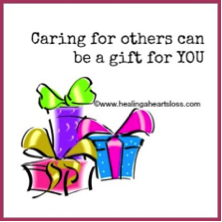Friends, other family members and people I do not know personally have to take care of others who are ill and or dying. What losses are connected with these scenarios? What strengths come from being supportive of others? What gifts can be found in the process; if you choose to look for them?
Losses and caring for someone else are a topic many do not realize is important until it is “YOU” doing the care taking or “YOU” who is being cared for. Consider for a moment loss such as; your freedom, ability, privacy, opinions, free will, being heard, mobility, choice, control, joy, happiness as you knew it, finances, health and more.
Now, which person does each loss scenario refer to; is it the care taker or the person being cared for? Perhaps, it is both. Hmmm, this is food for thought. The likelihood of this being “YOU” in one way or another is quite strong given the age demographics of the baby boomers and the sandwich generation — the individuals who are parents with children at home and who are actively caring for elderly parents at the same time.
When contemplating the strengths that come from being supportive of others what do you think of; perhaps, a strong moral character, a respect for family or friends, a duty to take care of another, an obligation honoured or love? For some it may be none of the above.
Take a moment and ponder the possible gifts received when caring or being cared for. There could be an opportunity for more intimate conversations on life’s relevant issues pertinent to the situation. The sharing of stories, dreams, fears, trust and wishes along with the changing aspects of hope. This can build a priceless relationship that would not happen any other way.
Many of us are not unexperienced enough to know there can be tremendous downfalls when caring for someone else. We see our friends, neighbours or others who in some shape or form have had to change their lives as they knew it to be in order to assist a family member who is struggling with age related conditions or who is younger and has an illness that impairs their own ability to care for themselves.
I know caring and being cared for are not all roses and fairy tale endings, but stop for a moment and see the bigger picture, the possible gift!
Is it time, love and something deeper?
All the best,
Barbara Gillett Saunders
Grief Counsellor/Thanatologist

